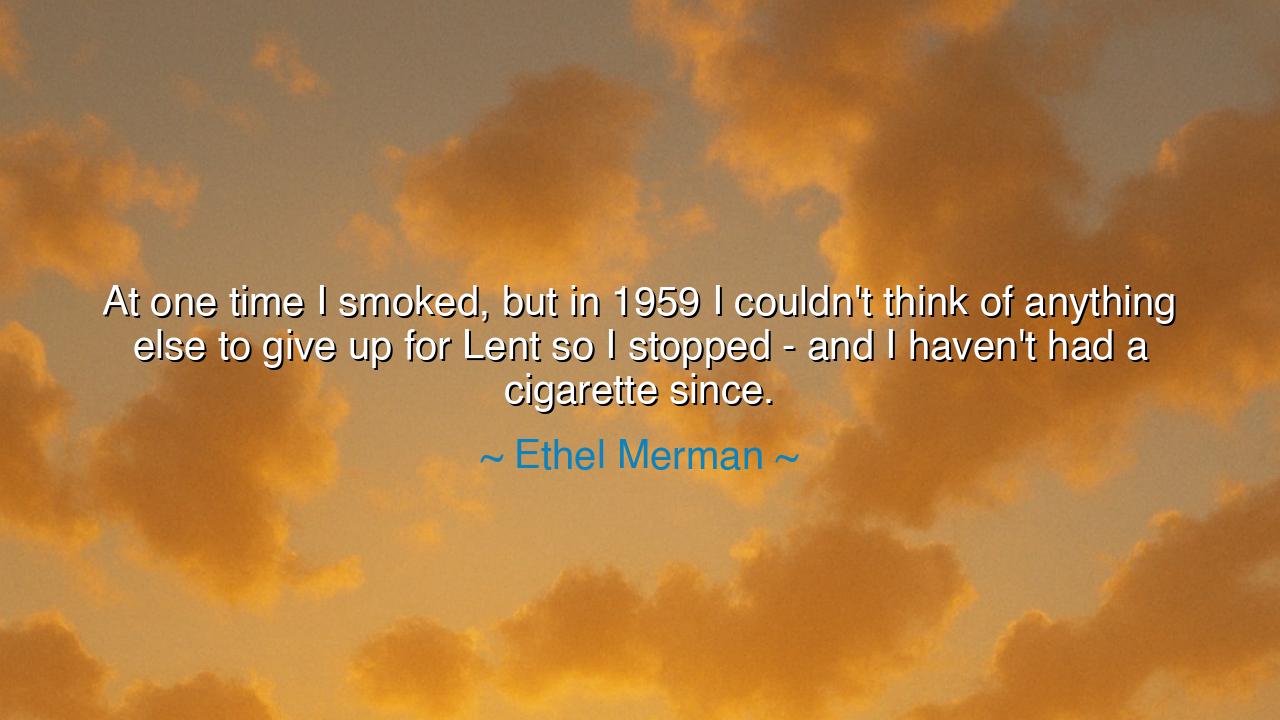
At one time I smoked, but in 1959 I couldn't think of anything
At one time I smoked, but in 1959 I couldn't think of anything else to give up for Lent so I stopped - and I haven't had a cigarette since.






The words of Ethel Merman — “At one time I smoked, but in 1959 I couldn't think of anything else to give up for Lent so I stopped — and I haven't had a cigarette since” — are at once simple and profound. Beneath their casual humor lies a lesson in willpower, transformation, and grace. Merman, the great voice of Broadway, whose spirit could fill an entire theater, reveals here a truth that resonates across ages: that sometimes, great change begins not from grand resolutions or thunderous revelation, but from a small, almost accidental act of surrender. Her story reminds us that the sacred power of renewal often hides in the most ordinary decisions — a fleeting moment, a passing thought, a quiet choice that alters the course of a life.
To understand the depth of her words, we must recall the meaning of Lent, that ancient season of reflection and sacrifice observed by millions of Christians around the world. Lent calls believers to relinquish something — a comfort, a pleasure, a habit — in order to draw closer to the divine. It is a period of forty days that mirrors Christ’s own forty days in the wilderness, a time of testing, restraint, and renewal. Merman, perhaps without full theological intent, took up this tradition. Yet her act of giving up smoking — a habit that bound both body and will — became far more than a seasonal gesture. In choosing to abstain, she discovered freedom. What began as an exercise in devotion ended as a liberation of the self.
The year 1959 marks more than a date in her life; it symbolizes a turning point of human resolve. In that era, smoking was not only common but fashionable — a symbol of sophistication and control. To quit was to swim against the tide of culture itself. Yet Merman’s casual phrasing, “I couldn’t think of anything else to give up,” reveals a paradoxical truth: great strength often hides in simple intention. She did not quit with grand speeches or public declarations; she simply stopped. And from that simple act came a lifelong transformation. So it is with many who walk the path of self-mastery — the change begins not with drama, but with quiet decision, repeated faithfully until it becomes destiny.
In her choice, we hear echoes of ancient stories. When Siddhartha Gautama, the man who became the Buddha, sat beneath the Bodhi tree, he did not know that enlightenment awaited him. He simply decided not to rise until he had seen the truth. Like Merman, he took a small, resolute stand — and that stand reshaped the course of his soul. Likewise, Saint Augustine, once captive to his own desires, found redemption when he whispered, “Lord, make me chaste — but not yet.” And yet, when the time of surrender came, he, too, gave up what enslaved him. These stories remind us that in the rhythm of human life, renunciation is not loss, but liberation. The act of giving up what binds us opens the way to what fulfills us.
Merman’s story also carries a lesson about discipline and the nature of habit. What begins as a small indulgence can, over time, master the soul. To break such a chain requires more than willpower — it requires intention aligned with purpose. Lent, at its heart, is this very alignment: the practice of taking one small step toward a greater freedom. For Merman, that step was the end of cigarettes. For another, it might be the end of bitterness, envy, or distraction. Each act of renunciation, when done with sincerity, awakens the divine strength within — the power that reminds us we are not slaves to our impulses, but stewards of our own will.
What makes Merman’s reflection beautiful is her lack of solemnity. She does not boast, nor does she dramatize. There is in her tone a lightness, even humor — the laughter of one who has overcome herself. This is wisdom in its most natural form: the understanding that self-control need not be grim, that transformation can come through grace as much as through struggle. Her story tells us that when the heart is open, even the smallest choice can be blessed by providence. The divine often works not through thunder, but through whisper — not through fire, but through quiet decision.
The lesson of Ethel Merman’s words is one of humility and strength. Change begins where intention meets surrender. One need not wait for perfect timing, grand motivation, or spiritual certainty. Begin where you are. Give up one thing that does not serve your spirit, and you may find that a thousand burdens fall away with it. Her life reminds us that faith and discipline are not distant virtues, but living companions in the everyday.
Therefore, let her words echo through generations as a gentle commandment: if there is something that enslaves your body or dulls your soul, lay it down. Do it not for show, but for freedom. You may begin out of duty, as Merman did — but you may end in joy. For the smallest act of renunciation, when offered with sincerity, becomes a sacred act of cooperation with the Divine. And in that moment, as the ancients taught, you cease to be ruled by the world and become ruler of yourself.






AAdministratorAdministrator
Welcome, honored guests. Please leave a comment, we will respond soon